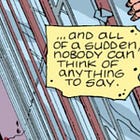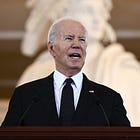When Auld Acquaintance Is Forgot
My 2024 in review, through a lens of credibility and compassion
One of my highlights of 2024 was the solar eclipse. I will never forget the moment of totality: the glow of the corona, the stillness of the world, the glimpse into the incomprehensible vastness of the universe. It felt like a once-in-a-lifetime experience, not just for the natural wonder but the communality. Everyone I know in the United States was excited for it. Life as usual stopped so we could witness it. It was, if you’ll pardon the pun, a universal experience.
We are lucky enough to live in an age when such phenomena can be predicted and explained. For most of human history, the moon blocking out the sun in the middle of the day would have seemed a terrifying omen. Imagine how disorienting, how discomforting, how disillusioning it would be to see something so beyond your comprehension happening in the sky.
It may be similar to what New Jerseyans have experienced over the last couple months (albeit with less existential dread). As you are probably aware — perhaps from personal experience — a surge in reported sightings of large aerial vehicles, said to be emitting bright lights and loud humming sounds, has caused widespread confusion and consternation in and around the Garden State. Theories abound about the source and nature of what have commonly been referred to as drones. By and large the authorities have not shown much interest in, let alone offered any information about, what they are and who is flying them.
As news of the sightings spread, so did the jokes about those who are paranoid about them. Many, maybe most, of the reports have turned out to be normal aerial phenomena, and it’s hard not to chuckle at fearmongering politicians mistaking constellations or Star Wars props for UFOs. But however naïve or suggestible you think the drone-spotters are, the fact is that people have been legitimately concerned and afraid, and the Biden Administration’s only response to constituents (and even state and local governments) desperate for answers has been to deny that anything unusual is going on at all.
Put yourself in their shoes. If you and your family saw something strange flying overhead — no matter how benign, legal, and expected it may be in actuality — and the only thing the people whose job is to protect you could be bothered to say is to not believe your own lying eyes, would you find that reassuring? Or would you conclude that, through some combination of apathy, incompetence, or dishonesty, the powers that be are not as trustworthy as they claim to be?
As I reflect on the tens of thousands of words I have sent to your screens in 2024, the closest thing to a connective thread among my writing — to which I will self-indulgently pepper links in the paragraphs below — has been this: When institutions and leaders show contempt for the principles and people they purport to represent, they lose their credibility, and that has consequences.
Of course, the most obvious manifestation of this in 2024 was Donald Trump’s reelection. Joe Biden’s presidency has been defined by a commitment to technocratic incrementalism. Not only has he been disinterested in whether his actions are popular or successful, but he staked the fate of the country on his stubborn insistence that they secretly were. The surge of support and enthusiasm for Kamala Harris when Biden dropped out was a sign of how rare and empowering it is for the Democratic Party to acknowledge its own fallibility; the feeling was fleeting. As was apparent from the start of the primary cycle to the eve of Election Day, Biden and Harris wagered that the threat of a more-prepared and vengeful Trump returning to office would convince enough reluctant supporters to build a winning coalition, so they needn’t bother addressing voters’ discontentment with the status quo. The failure of this theory of politics should be a moment of reckoning for the Democrats. (The same goes for the Green Party, whose sub-one-percent showing in a year of widespread leftist disillusionment shows how vacuous and unserious the movement has become.)
Another such dissonance has altered my own relationship to my heritage this year. As a Jewish man, I am vehemently opposed to the ongoing genocide in Gaza, and appalled by the idea that such atrocities are claimed to be committed in my name. I see recognizing the parallels between the persecution we have been facing for millennia and the suffering of modern peoples face as a sacred obligation of my Jewish identity. So it is alienating to hear others within our community who purport to uphold the same belief in tikkun olam cite the horrors of our history to rationalize and even cheer civilian massacres and collective punishment. As I write this essay in the middle of Hanukkah, it occurred to me that I have felt almost bashful about celebrating the holiday this year, for fear that expressions of Jewishness nowadays are inferred to be signs of support for Israel.
Worse still are the gentile politicians, including leaders from both parties, who have spent this year insisting they are my allies while tokenizing me in the service of Zionism. I consider it anti-Semitic to condone police brutality against Jewish students, make bedfellows with bigots over their shared support for Israel’s brutality, and compare antiwar protestors to white supremacists. (Note that most Jewish Americans want a ceasefire and to reevaluate our government’s patronage of the Israeli military.) As Trump retakes power, it will be even more crucial to combat hatred against marginalized groups. When a politician thinks it appropriate to call Jewish college kids anti-Semitic but does not bat an eye at the unfathomably offensive claim that the events of October 7 were “as consequential as the Holocaust” — as Joe Biden said, to virtually no pushback — how can I trust that they will have my back?
Such credibility-squandering is apparent outside of politics, to varying degrees of societal importance. The sports industry’s inconsistent attention span for incidents of partner violence undermines their occasional attempts to take the issue seriously. Major League Baseball keeps tinkering with the rules without solving the problems they claim to want to fix, from a clumsy proposal that goes way too far in combatting the increase in strikeouts that may have reached a natural inflection point anyway, to tweaking the Home Run Derby without addressing its inherent frustrating boringness. MLB’s new playoff format, designed to add more excitement, ended up making anticlimactic first-round sweeps more likely. Deserving Baseball Hall of Famers fail to gain entrance into Cooperstown because of antiquated standards, facile arguments, and voters who take advantage of their secret ballots to vote measurably worse than those who open their picks to public scrutiny. The NFL team I am cursed to be a fan of, the Cleveland Browns, frittered away the goodwill from their underdog playoff run last year, doubled down on their morally and strategically dubious commitment to their sex pest quarterback, then acted surprised when fans were frustrated. Even in the world of sandwiches, I’ve bemoaned that delis outside Philadelphia hype up their cheesesteaks without trying to understand what makes the real ones so special.
My grandmother, Joanne Lewis, passed away in February. It is impossible to distill a person so magical into an obituary, let alone a couple philosophical principles. Yet I’ve been thinking a lot lately about two of her most-strongly held beliefs. The first is that Grandma Joanne saw information as inherently empowering. She devoted the biggest chunk of her lifelong activist energy to founding and running the Global Issues Resource Center, a nonprofit organization that sought to educate ordinary people so they could advocate for change. The second is one of her signature lines that’s been rattling around in my head, a lesson from her work as an oral historian: “The truths are more important than the facts.”
Together these ideas explain so much of our present moment. A reflex to stamp out grassroots ideas, not encourage them, begets a crisis of credibility. In a time when our institutions come off as both condescendingly technocratic and unabashedly hypocritical, when polarization and cognitive dissonance reshape our realities, the truth that so many people now feel — that the authorities have not earned the trust they expect — is what ultimately guides them.
I believe the path forward is to emulate another of Joanne’s signature traits: how much she valued personal connections. She carried business cards listing herself as a “Professional Jewish Mother,” and tried to adopt everyone she met, from medical assistants to cable guys to telemarketers. “We don’t have to share beliefs,” she always said, “just a planet.”
It may sound Pollyannaish in an age of unapologetic bigotry. I don’t expect to break bread with people like Trump, who does not consider me a full person because of my heritage, or Biden, who sees his Jewish constituents as mere pawns in service of his ideological agenda. But even if our leaders do not care about fostering trust, we can start by forging it with each other. This means taking care of your community: checking on your neighbors, helping out where you can, showing solidarity with the many groups of people who are worried about what’s coming. It also means finding compassion for, and seeking common ground with, those who have real reasons for losing faith in institutions that took their own credibility for granted.
Many of us are heading into the new year with a sense of unease. All I can say is that the surest way I’ve found to stay positive when the world seems cold is to warm someone else’s heart. May compassion be our guiding star as we enter 2025, and may we never let the darkness on the horizon eclipse that light.








